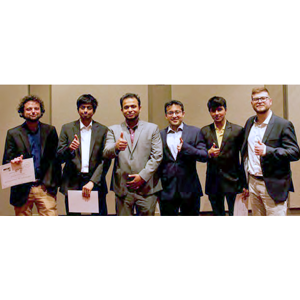
On May 8, Texas A&M University’s Department of Residence Life and Utility & Energy Services announced the winners of the 2nd annual U-Challenge. The team that took first place at the graduate level included five doctoral students from the research group of Dr. M.M. Faruque Hasan, a Texas A&M Energy Institute faculty affiliate and an assistant professor in the Artie McFerrin Department of Chemical Engineering. The members of the team included Ishan Bajaj (team leader), Shachit Shankaran Iyer, Salih Emre Demirel, Akhil Arora and Spyridon Tsolas, plus one master’s student from the subsea engineering program, Mohammad Alvi. The team was assigned Davis-Gary Hall.
The U-Challenge tasked each of the eight teams – four undergraduate and four graduate – to come up with ways to increase the efficiency of an assigned residence hall. The teams were given access to utility and energy consumption data for their assigned hall and then presented infrastructure and student engagement recommendations improvements to decrease consumption.
When examining the data, the team was able to determine that chilled water, heating hot water and electricity have the largest impact on the building’s utility costs. Through their research, the team was able to come up with novel approaches to cut the costs associated with each of these areas. For the chilled water and heating hot water, the team recommended utilizing desiccant-based dehumidification, as well as replacing the pneumatic water valves with direct digital control valves.
To solve the high electricity costs, the team made the largest and most novel solution: the implementation of a biogas digester to provide energy across campus. Essentially, food waste goes into the biogas digester, where it is then fermented. The process results in biogas – which can be used in the same as other natural gas sources – and compost – which is a high-quality fertilizer.
In addition to the infrastructure recommendations, the team also made student engagement recommendations, such as a sustainability orientation, monthly utilities flyers, and student competitions to promote active engagement.
For their efforts, the student teams who made it to the final round will have the have the chance to see their recommendations implemented at Texas A&M in the future. Residence Life representatives are excited to work on implementing student suggestions in their efforts to make sustainability an Aggie tradition.
This article first published by the Texas A&M Engineering Experiment Station.
